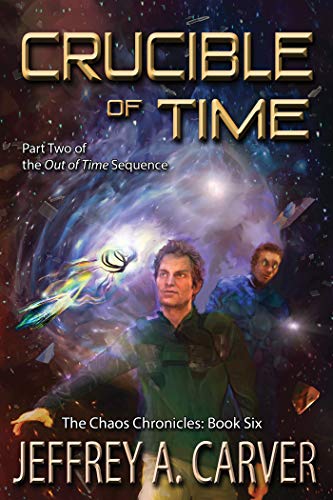 |
| Bookcover via Amazon.com |
Let me start with my first impressions, and I was confused. As a reader, it's very tough to jump into a series in the sixth iteration without reading the previous books. Sometimes it can work; in others, it is far more complicated, such as "Crucible of Time." The prologue, however, was exciting, and I felt it was a benchmarker for what prologues should be in Sci-Fi. I know many indie sci-fi books where the prologue is not as encapsulated as this one and is an infodump. The prologue is not at all an infodump; it's rather startling and alluring and grabbed me into the world immediately.
Now, into the critiques, I go for "Crucible of Time," and to start, I am going with "Story Structure, Foundation, and Presentation," and I note an issue with pacing. There are portions of this novel that pace very slow and have minimal tension. I found a lack of character tension at times between character-specific scenes, and I found that it was also missing the tension in the overall plot at times. Sci-fi is tricky because the reader wants it to be a world that gathers their imagination where the science is sound but also wants it to be enjoyable to read. In this case, at times, it was all science and, thus, made the pace through those sections slow and tedious to read. I, however, am happy to report the science was sound, and I will get into that later.
Next, in the "Story Structure, Foundation, and Presentation" category, I go into "Foundation" and specifically the punctuation use choices. Sci-Fi is a lot similar to high fantasy in that the writer could make new languages or ways for people to communicate in the story. How does a writer come up with a unique way to showcase this new way or the language while delineating a difference between it and the standard narration? There are a million ways to do such a delineation, but for "Crucible of Time" was a series of slashes, and ellipsis and italics. In the occasional use of a paragraph or so, it's not a big deal to combine all of those elements of punctuation. However, when it's the majority of a chapter or several portions of the page, the italics especially can be painful to the eye on an e-reader. I had to put the book down a few times to let my eyes rest while those portions were in use, and while I understand why it was used, it didn't make it an easy read at all for me. So if you have eye issues or you are also in bifocals, be aware of this. It might not be a fun time reading. Still, these scenes are very critical portions of science for the novel most often, or they are communication exposition for understanding the worldbuilding.
With that said, let me go into what I enjoyed about "Crucible of Time," and I start with the "Lost in Translation" category. I never was confused about the story's specific science, which was terrific. Everything presented was grounded in facts that made sense for the worldbuilding and had a lot of sound purposes. I found that the science and alien races all were done well, and I enjoyed how I never felt like researching or googling anything to figure out if it was possible or not.
Next, under "Whole Story," this is a book that answers the questions in it, while also remains part of a series. I did find that for what happened in the book, it was resolved. There are a series of things I did not understand because they are part of the overall story, but again I didn't read the other five books.
Under the category of "Cliche Much," I didn't find anything cliche or boring as far as idea use. The ideas were sound, and there were no weird "chosen one" issues or "time travel cliche" problems that can come with some sci-fi dealing with similar ideas. I loved the way time travel was handled here, I loved how the ideas made sense to it, and I enjoyed the problem-solving aspect to it.
Overall, this was a good novel. I don't think I'm the target audience for "Crucible of Time" because it's not my kind of sci-fi. But that said, I do know some people are going to love this book and the series. If you enjoy well-grounded principals of science in your Sci-Fi, ideas on how the geopolitical aspect of planetary warfare can impact things for generations and are into adventure between all of that, pick this up!
Score
With that said, I am scoring "Crucible of Time," a score of 92/100, which is a five-star review on Goodreads and Amazon.




